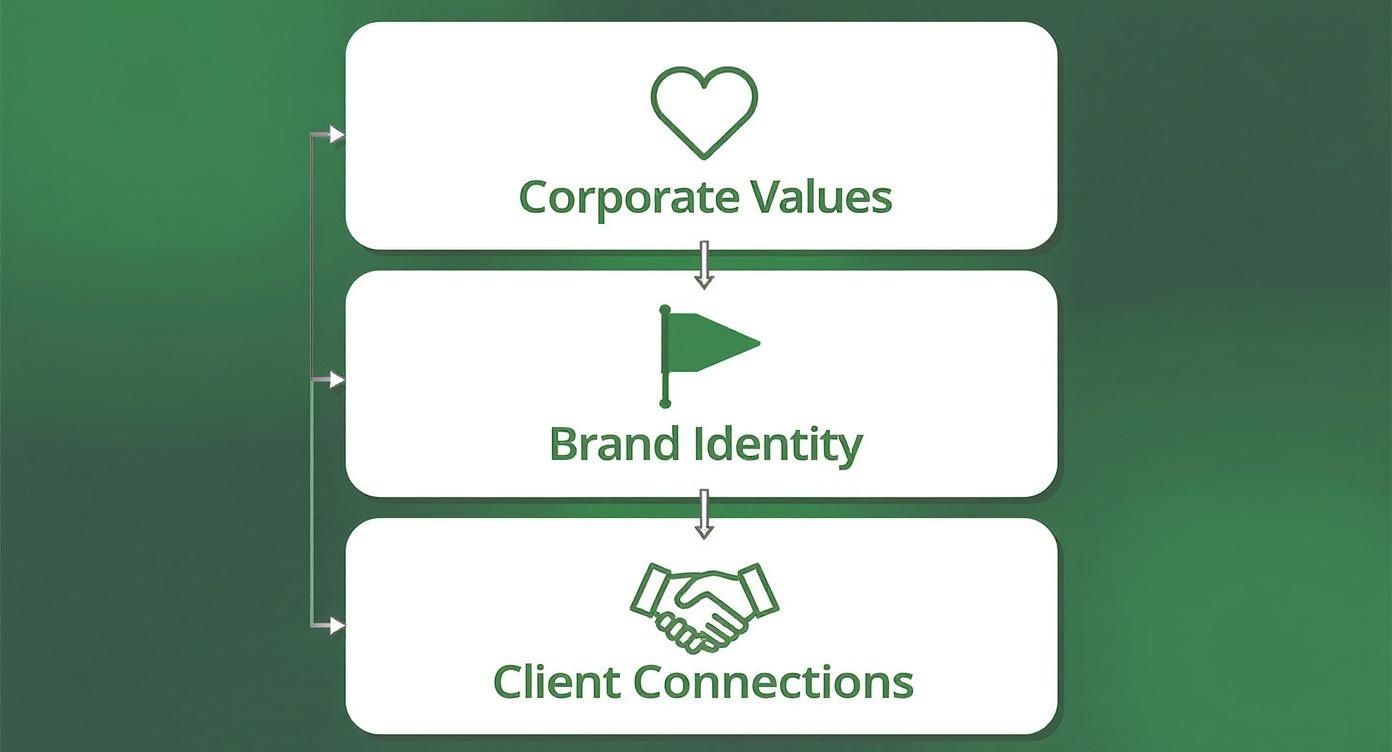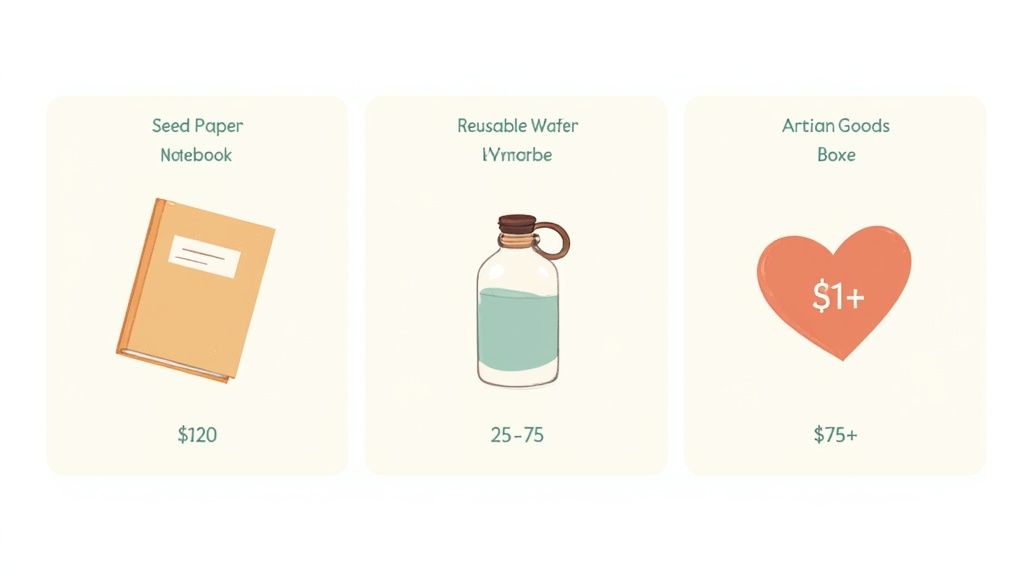So, what exactly are environmentally friendly corporate gifts? Think of them as a way to show appreciation while also making a statement about your company's values. These are items that keep environmental impact to a minimum, whether through sustainable materials, ethical production, or just plain reusability.
Table of Contents
From notebooks made of recycled paper to snack boxes filled with ethically sourced treats, these gifts prove your commitment to corporate social responsibility. More importantly, they leave a lasting impression on employees and clients, strengthening team bonds and professional relationships.
Why Sustainable Corporate Gifting Is the New Standard
The corporate gifting game is changing. We're moving past the era of cheap, disposable swag that inevitably ends up in a landfill. Businesses are finally catching on that a gift is so much more than a simple token—it’s a direct reflection of a brand's identity and its deepest values. This shift has pushed environmentally friendly corporate gifts right into the spotlight of modern business strategy.
This isn't just about looking good, either. It’s a direct response to a real, growing demand for authenticity and responsibility. Let's be honest, employees and clients are more clued into environmental issues than ever. They want to connect with companies that walk the walk on sustainability, which makes a thoughtful, eco-conscious gift a surprisingly powerful way to build stronger, more meaningful relationships.
Elevating Team Recognition with Purpose
We all know how vital team recognition is—it’s the fuel that keeps morale and engagement high. Recognizing hard work makes employees feel seen and valued, which is the cornerstone of a positive company culture. But when you show that appreciation with a sustainable gift, the impact just skyrockets. A simple "thank you" suddenly becomes a powerful statement about your company's values. It shows you care about your people and the planet.
Think about it. Celebrating a huge project milestone with a flimsy plastic trophy just feels a bit empty, doesn't it? Now, imagine giving each team member a durable, branded thermos made from recycled materials instead. It’s not only a practical item they'll actually use every day, but it also sends a subtle message about reducing single-use plastic. Just like that, a routine gesture of recognition becomes a shared experience of doing something positive, reinforcing the team's collective success.
A thoughtfully chosen, responsibly made gift reflects your company's values and sends a message of care and intention. It becomes a lasting impression—a quiet reminder of who you are and what you stand for.
The Financial and Brand Impact of Going Green
This whole movement toward sustainability is more than just a feel-good initiative; it's backed by some serious market growth. The corporate gifting market is on track to grow by an additional $211 billion globally by 2028, and a huge chunk of that is being driven by the demand for eco-friendly options. To keep up, businesses are turning to specialized corporate gift fulfillment solutions to manage the logistics of sending thoughtful, impactful presents. Companies are getting serious about cutting the waste and carbon emissions tied to old-school gifting.
Choosing sustainable gifts brings some real, tangible wins to the table:
- Strengthens Brand Identity: It immediately positions your company as forward-thinking and socially responsible.
- Boosts Employee Loyalty: It creates a sense of pride and alignment among team members who hold the same values.
- Deepens Client Relationships: It builds trust by demonstrating that your principles go far beyond the bottom line.
At the end of the day, sustainable gifting isn't just a fleeting trend. It's the new benchmark for how modern, conscientious businesses show appreciation and build relationships that truly last.
What Makes a Corporate Gift Genuinely Eco-Friendly?
It’s easy to get lost in a sea of "green" and "earth-friendly" labels. But what really makes a corporate gift sustainable? The secret is to look at its entire journey, not just the finished product. Think of it like a farm-to-table meal—you care about where the ingredients came from and how they were grown, not just how the final dish tastes.
A truly eco-friendly gift is measured by its whole lifecycle, from the raw materials used to make it all the way to what happens when it's thrown away. This big-picture view is essential. For example, a bamboo pen seems like a solid green choice, but if it’s shipped halfway across the world wrapped in layers of plastic, its positive impact shrinks considerably. Real sustainability is about making conscious choices at every step.
The infographic below shows how sustainable gifting can be a powerful way to connect your corporate values and brand identity, ultimately building stronger relationships with clients and your team.

As you can see, when your company’s core values are the foundation, your brand identity becomes more authentic. Actions like sustainable gifting then become a natural extension of who you are, strengthening those all-important external connections.
The Three Stages of a Sustainable Gift
To figure out if a gift is genuinely eco-friendly, you need to break down its existence into three key phases. Each stage is an opportunity to make a more responsible choice, turning a simple act of recognition into a powerful statement about your company's commitment to the planet.
1. Sustainable Materials and Ethical Production
The story of any gift starts with what it’s made of. The best choices are materials that are renewable, recycled, or biodegradable.
- Renewable Resources: Materials like bamboo, cork, and organic cotton are fantastic because they replenish themselves naturally. This reduces our reliance on finite resources. Swapping a standard plastic-covered notebook for one with a cork cover is a simple, effective change.
- Recycled Content: Gifts made from materials like recycled PET (rPET) plastic bottles or reclaimed metals breathe new life into waste that would otherwise end up in a landfill. A cozy fleece blanket made from rPET is a perfect example of the circular economy in action.
- Ethical Sourcing: This is about more than just materials; it’s about people. Looking for fair-trade certifications ensures that the artisans and workers behind the product are treated and paid fairly for their craft.
Sustainability has become a major driver in corporate gifting. Companies are actively choosing gifts made from biodegradable, upcycled, or recyclable materials and are seeking out ethical producers to align their gifting programs with social responsibility. You can find more on this global shift in corporate gifting trends from Bloomsybox.
To help you navigate your options, here’s a quick comparison of some popular sustainable materials.
Eco-Friendly Gift Material Comparison
| Material | Key Environmental Benefit | Example Gift | Best For |
|---|---|---|---|
| Recycled PET (rPET) | Diverts plastic bottles from landfills and oceans; reduces the need for new plastic production. | Fleece blankets, tote bags, apparel | High-volume gifts where durability and a soft feel are important. |
| Bamboo | A rapidly renewable grass that requires no pesticides and less water than trees. | Cutting boards, utensils, pens, speakers | Sleek, modern gifts that need a sturdy, wood-like material. |
| Cork | Harvested from the bark of cork oak trees without harming the tree, making it highly renewable. | Notebooks, coasters, mouse pads | Unique, lightweight items with a natural, textured aesthetic. |
| Organic Cotton | Grown without synthetic pesticides or fertilizers, protecting soil health and water quality. | T-shirts, tote bags, towels | Apparel and textile gifts where comfort and skin-friendliness matter. |
| Recycled Stainless Steel | Reduces mining impacts and energy consumption compared to producing virgin steel. | Water bottles, travel mugs, lunchboxes | Durable, long-lasting gifts that promote reusability. |
Choosing the right material is the first and most critical step in creating a gift that reflects your company's values.
2. Durability and Thoughtful Team Recognition
The single most sustainable gift is one that people actually use—over and over again. Longevity is key, because a useful, well-made item won’t be tossed in a drawer and forgotten. This is why team recognition is so important; it ensures the gift has meaning. When people feel appreciated, they're more likely to use and cherish the item they receive.
This is where thoughtful team recognition comes into play. Instead of a generic trinket, tying a gift to a specific achievement makes it meaningful. Celebrating a project launch with a high-quality, insulated travel mug is far more impactful than a branded disposable cup. The mug becomes a daily reminder of that success and the company’s genuine appreciation.
A few practical ideas:
- A solar-powered portable charger for your on-the-go sales team after a record-breaking quarter.
- Durable organic cotton tote bags for new employee welcome kits, making them feel part of the team from day one.
- A set of reusable stainless steel straws as part of an office-wide wellness challenge, recognizing everyone's participation.
3. End-of-Life Responsibility
Finally, what happens when the gift has run its course? A truly eco-friendly product shouldn't become a burden on the planet. The best end-of-life options are reusability, biodegradability, or recyclability.
A fantastic example is a "plantable" gift, like a card made from seed paper that can be planted to grow wildflowers or herbs. Once it has served its purpose as a card, it returns to the earth and creates new life. This kind of thoughtful planning transforms a simple gesture of recognition into a regenerative act, perfectly capturing the spirit of sustainable corporate gifting.
Eco-Friendly Gift Ideas for Any Occasion and Budget
You don't need a massive budget to give corporate gifts that are both meaningful and environmentally friendly. In fact, some of the most memorable and appreciated items are surprisingly affordable. The real secret is matching the gift to the occasion, making sure every gesture feels thoughtful and responsible.

This just goes to show that sustainability is within reach for any company, big or small. By thinking in budget tiers, you can create a flexible recognition program that celebrates everything from small wins to major milestones, all without straying from your green values.
Gifts Under $25
For those everyday thank-yous, team-wide celebrations, or simple gestures of appreciation, a budget-friendly gift can still leave a big impression. These items are perfect for building a positive, eco-conscious culture one small step at a time and showing consistent recognition.
- Branded Seed Paper Notebooks: Instead of standard notepads, these are made from recycled paper packed with seeds. Once the notes are done, the whole notebook can be planted to grow wildflowers or herbs. It's a beautiful metaphor for growth and new ideas.
- High-Quality Fair-Trade Coffee or Tea: A simple bag of ethically sourced coffee or a box of organic tea is a classic for a reason—it’s a consumable treat that leaves no waste. It’s the perfect way to thank someone for going the extra mile on a project.
- Reusable Utensil Sets: A compact set of bamboo or stainless steel cutlery is incredibly useful for anyone eating at their desk or on the go. This practical gift actively helps cut down on single-use plastics every single day.
These small tokens work so well because they’re genuinely useful and connect to a larger purpose. They turn daily recognition into a consistent, subtle reminder of what your company stands for.
Gifts from $25 to $75
Mid-range gifts are your go-to for more significant moments, like work anniversaries, hitting quarterly goals, or wrapping up a big project. This price point opens the door to more substantial items that blend great design, daily utility, and solid eco-credentials. Team recognition at this level shows a deeper appreciation for major efforts.
Imagine celebrating a major project launch by giving everyone on the team a small desk plant in a biodegradable pot. It’s a great way to foster a sense of shared accomplishment and gives them a living symbol of the growth they achieved together.
The most memorable corporate gifts are those that solve a problem or add genuine value to the recipient's daily life. A durable, reusable item serves as a long-lasting reminder of appreciation, far outliving a disposable alternative.
Here are a few other great ideas in this range:
- Solar-Powered Chargers: A fantastic gift for remote employees or frequent travelers. A solar power bank is practical, innovative, and runs on clean energy.
- Smart Reusable Water Bottles: If you're looking for tangible gift ideas, high-quality eco-friendly water bottles that track hydration are a brilliant choice. This kind of gift promotes both wellness and sustainability.
- Organic Cotton Tote Bags or Backpacks: A well-designed, durable bag from a certified brand is something employees will actually use for years, reducing their reliance on plastic bags.
Gifts Over $75
For those truly special moments—honoring a top performer, celebrating a huge career milestone, or giving an executive-level gift—this is where you can make a serious impact. These gifts should reflect the gravity of the achievement and show how much you value the individual's contribution.
Don't just think about physical items, either. One of the most powerful gestures is making a company-sponsored donation to an environmental cause in an employee's name. It aligns perfectly with a sustainable gifting program and creates a deeply meaningful reward, especially for employees passionate about giving back. For more ways to create these kinds of moments, check out these employee appreciation ideas.
Other premium options to consider:
- Ethically Sourced Artisan Goods: A hand-crafted blanket from a fair-trade cooperative or a unique piece of pottery from a local artisan tells a story. It supports small, ethical businesses and gives your employee something truly one-of-a-kind.
- Sustainable Product Subscription Boxes: A subscription box filled with curated eco-friendly snacks, wellness products, or home goods is a gift that keeps on giving. It’s a great way to introduce someone to new sustainable brands.
- High-Quality Tech from Certified B Corps: Gifting premium tech like noise-canceling headphones from a B Corp-certified company ensures the product isn't just high-performing but also comes from a business committed to ethical and environmental standards.
How to Perfect Your Sustainable Packaging and Delivery
Think about this for a moment: you’ve spent weeks picking the perfect, sustainable gift for your team. Maybe it's a beautifully crafted bamboo speaker. Then it arrives at their doorstep entombed in a mountain of plastic bubble wrap and styrofoam peanuts.
That jarring experience completely undermines the thoughtful message you were trying to send. The final steps—packaging and delivery—are just as critical as the gift itself. They're the last impression you make.

Getting the logistics right ensures your commitment to sustainability is clear from the moment the box is sealed to the second it’s opened. It’s about creating a cohesive experience that reinforces your company’s values every step of the way.
Choosing Planet-Friendly Packaging Materials
Moving away from single-use plastics isn't just a trend; it's a core part of corporate responsibility. Your packaging is one of the most visible ways to show you’re serious about it. Thankfully, there are plenty of innovative and effective alternatives out there today.
Think of your packaging as the opening act for the gift itself. It sets the tone. Instead of reaching for the usual plastic, consider these better alternatives:
- Compostable Mailers: Made from materials like corn starch, these break down in a commercial compost facility without leaving harmful junk behind.
- Recycled Cardboard Boxes: Using boxes with a high percentage of post-consumer recycled content dramatically cuts down the need for virgin paper and helps conserve forests.
- Mushroom Packaging: This stuff is amazing. It's literally grown from mycelium (the root structure of mushrooms) and agricultural waste. It’s fully biodegradable and can be composted right in a backyard garden.
- Air Pillows from Recycled Materials: If you need cushioning, look for air pillows made from recycled or biodegradable plastics. They offer the same protection as traditional bubble wrap without the environmental guilt.
These options prove you don't have to choose between protecting the gift and protecting the planet.
Minimizing Your Shipping Footprint
What you ship in is only half the battle. How you ship it plays a massive role in your overall environmental impact. An inefficient shipping plan can rack up unnecessary carbon emissions, quickly offsetting the good you did by choosing environmentally friendly corporate gifts in the first place.
You need to be as intentional with your delivery as you are with your gift selection. The corporate gifting market is booming, and sustainability is no longer a "nice-to-have." It's an expectation. In fact, by 2025, an estimated 65% of corporate gift procurement teams will have standardized eco-friendly packaging and recycled materials. This signals a major shift in the industry, as you can read more about in this corporate gifting market trend report.
To shrink your carbon footprint, focus on two key areas: efficiency and partnerships. Consolidate orders whenever possible to send multiple gifts in a single shipment, which means fewer delivery trucks on the road. For remote teams, see if you can drop-ship directly from a supplier who specializes in sustainable fulfillment.
A powerful move is to partner with carbon-neutral carriers. These shipping companies actively invest in projects like reforestation and renewable energy to offset the emissions their deliveries create. It’s a simple way to ship your gifts with a much clearer conscience.
A Checklist for Vetting Fulfillment Partners
Let's be realistic—most companies use a fulfillment partner to handle packaging and shipping. It’s absolutely critical that their practices align with your sustainability goals. A mismatch here can undo all your hard work.
Use this simple checklist to vet potential partners and make sure your team recognition is green from start to finish:
- Material Transparency: Do they tell you exactly what their packaging is made of? Ask for specifics, like the percentage of recycled content and proof of biodegradability.
- Plastic-Free Options: Can they guarantee a 100% plastic-free unboxing experience? That means no plastic tape, no bubble wrap, and no poly bags.
- Efficient Shipping Practices: How do they work to reduce emissions? Ask about their order consolidation strategies and which carriers they use.
- Carbon-Neutral Shipping: Do they offer carbon-neutral delivery options through their shipping partners? This is a huge green flag.
- Waste Reduction Policies: What are they doing to minimize waste in their own operations? Look for partners who have robust recycling programs and manage their resources responsibly.
Exploring Digital Gifts and Experiences
Let’s be honest: sometimes the most eco-friendly gift is the one that doesn't exist physically. Digital gifts and experience-based rewards are the ultimate zero-waste option. Nothing gets manufactured, nothing gets packaged, and nothing gets shipped. It's a powerful shift from "stuff" to "value"—creating lasting memories and genuinely improving someone's well-being.
This is where modern team recognition really shines. It’s instant, flexible, and hits that personal note that today's teams crave. Think about it: a well-timed digital reward that lands right after a huge success feels far more impactful than a branded water bottle that shows up three weeks later. Recognizing achievements in real-time shows you value your team right now.
The Power of Intangible Appreciation
The real magic of digital and experiential gifts is how personal they can be. You're no longer stuck with a one-size-fits-all gift. Instead, you can offer something that taps directly into an employee's professional goals, personal hobbies, or even their mental health. That kind of thoughtful team recognition shows you see them as a whole person, not just a name on a payroll.
Meaningful recognition is more than a quick "good job." It’s about reinforcing the behaviors you want to see and making people feel truly valued. Digital rewards do this with incredible speed and precision, drawing a direct line between great work and the company’s gratitude.
A recent study found that over 90% of consumers trust companies more when they are socially or environmentally responsible. Gifting experiences or donations isn't just good for the planet; it builds that same trust and loyalty from the inside out.
Practical Examples of Zero-Waste Gifts
When you ditch the physical, a whole new world of creative and impactful options opens up. These aren't just sustainable—they're often more desirable, offering a level of convenience and enrichment that traditional swag just can't match.
Here are a few practical examples to get you started:
- Mindfulness and Wellness App Subscriptions: Gifting a subscription to an app like Calm or Headspace is a direct investment in your employee's mental health. It’s a practical tool for managing stress, and it sends a clear message: we care about your well-being, both in and out of the office.
- Donations to a Charity in Their Name: For the team member who is deeply passionate about a cause, making a donation on their behalf can be one of the most personal gifts you can give. It connects their success at work to something bigger they believe in, creating a powerful emotional link.
- Tickets to Virtual Workshops or Online Courses: Show you're invested in their future. Offering access to a course that teaches a new skill or a ticket to a key industry webinar supports their career growth and shows you see a long-term future for them at the company.
- Experiential Vouchers: Give the gift of a great memory. Vouchers for a local cooking class, concert tickets, or a weekend getaway help people create positive experiences outside of work, which is absolutely vital for preventing burnout.
Seamless Integration for Modern Teams
For any of this to work, the delivery has to be effortless. The best way to do this is to bring recognition right into the tools your team uses every single day. For many of us, that's Slack. It’s the digital office, the virtual water cooler, and the perfect place to celebrate wins as they happen.
Tools that plug directly into Slack, like AsanteBot, allow managers and teammates to send kudos and redeemable points in real-time. This simple integration turns recognition from a formal, top-down chore into a natural, everyday habit. For example, a manager can give an instant shout-out for a successful client presentation, and that employee can immediately redeem points for a digital gift card or a donation—all without ever leaving their workflow. It’s not just a win for sustainability; it’s the kind of agile, instant recognition that modern teams thrive on.
Measuring the ROI of Your Sustainable Gifting Program
So, how do you prove that your shift to environmentally friendly corporate gifts is actually making a difference? To keep the budget and backing you need, it's not enough for it to just feel right—you have to show it delivers real business value. Moving past simple "thank you" notes requires a clear plan for tracking what's working and proving a tangible return.
Think of it like a complete health check-up for your gifting strategy. You need to check the vital signs (the hard numbers) but also ask how everyone is feeling (the sentiment). This mix of data and human feedback gives you the full story of your program's impact.
Tracking Quantitative Metrics
The clearest way to show value is with solid numbers. These data points offer objective proof of your program's efficiency and positive environmental footprint, making them perfect for those conversations with leadership.
Start by getting a handle on these key metrics:
- Waste Reduction: Tally up the single-use plastic items you've avoided by choosing reusable gifts. For example, giving 100 employees a quality reusable mug can keep an estimated 25,000 disposable cups out of landfills every single year.
- Carbon Savings: Work with fulfillment partners who offer carbon-neutral shipping and can report on the total CO2 offset. Suddenly, your delivery process becomes a measurable environmental victory.
- Cost-per-Use: A well-made, durable gift might cost more upfront, but its long life offers far better value than cheap swag that’s destined for the bin after a week.
Assessing Qualitative Impact
Numbers alone don't paint the whole picture. The real magic of sustainable team recognition is its power to build a stronger culture and bolster your brand from the inside out. This is where you need to listen.
It turns out that nearly 9 in 10 consumers are more loyal to purpose-driven brands. That loyalty begins with your own people—your most credible brand ambassadors.
You can gather this kind of feedback by:
- Employee Surveys: Tuck a few questions into your regular engagement surveys. Ask employees if the gifting program makes them feel valued and proud of where they work.
- Social Media Sentiment: Keep an eye on platforms like LinkedIn for mentions of your company gifts. A few happy posts from employees can do wonders for your employer brand.
- Recruitment Feedback: During onboarding, ask new hires if the company's commitment to sustainability played a part in their decision to join the team.
At the end of the day, a thoughtful, sustainable gifting program is a direct investment in a healthier workplace. When people feel their personal values line up with their employer's, it boosts everything from engagement to collaboration. For more on this connection, check out these proven strategies on how to improve team morale.
By weaving hard data together with compelling human stories, you can build an impact report that proves your program is a strategic investment, not just another line item on a spreadsheet.
A Few Common Questions
Dipping your toes into the world of sustainable corporate gifting can bring up a few questions. Let's tackle some of the most common ones so you can move forward with a clear and confident strategy.
Are Environmentally Friendly Gifts Always More Expensive?
Not necessarily. It's a common misconception that "eco-friendly" automatically means "expensive." While some high-end sustainable products do carry a premium price tag, there are plenty of amazing, budget-friendly options out there. Think seed paper, notebooks made from recycled materials, or even digital gifts that deliver big on impact without the cost.
The key is to shift your mindset from upfront cost to long-term value. A well-made, durable gift that people actually use is a far better investment than a cheap, throwaway item that ends up in a landfill. The real goal is to choose something thoughtful and lasting, sidestepping the waste that comes with typical corporate swag.
How Can I Be Sure a Supplier Is Genuinely Sustainable?
This is a great question. Vetting your suppliers is crucial to avoid "greenwashing"—when a company's claims don't match its practices.
The best place to start is by looking for credible, third-party certifications. These act as a seal of approval, showing that a company has been audited and meets specific standards.
- B Corp Certification: This is a big one. It means the company is legally required to consider the impact of its decisions on its workers, customers, community, and environment.
- Fair Trade Certification: This ensures that the people who make the products are paid fair wages and work in safe conditions.
- Forest Stewardship Council (FSC): For any paper or wood products, this certification guarantees they come from forests that are managed responsibly.
Don't be afraid to dig deeper. Ask for transparency about their supply chain and how their products are made. A truly sustainable supplier will be proud of their process and happy to share the details. It's also a smart move to request samples to check out the quality for yourself.
What’s the Best Way to Give Gifts to a Remote Team?
Remote and distributed teams are actually the perfect candidates for an eco-friendly gifting strategy. When you don't have a central office, the possibilities for waste-free recognition open up quite a bit.
With a distributed team, digital gifts and experiences are a fantastic, zero-waste solution. They offer immediate, meaningful recognition without a physical footprint, which is perfect for celebrating wins in real-time, no matter where your people are.
Here are a few practical ideas that work exceptionally well for remote employees:
- Go Digital: E-gift cards, subscriptions to mindfulness apps, or access to an online course can be delivered in a flash, especially when integrated with your team's communication tools.
- Ship Directly: If you do want to send a physical item, find a sustainable partner who uses eco-friendly packaging and can drop-ship directly to each employee’s home.
- Upgrade Their Home Office: A small desk plant, a high-quality reusable coffee mug, or other practical items that enhance their remote work setup are always a welcome and sustainable choice.
Ready to weave seamless, sustainable, and genuinely engaging recognition into your company culture? With AsanteBot, you can celebrate wins and reward your team with eco-friendly digital options right inside Slack. Start your free trial today and discover how easy it is to build a happier, more connected team.




